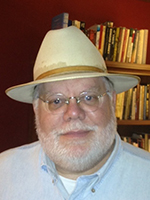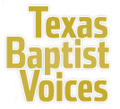I grew up in a good and loving Baptist church out in West Texas. Both of my parents were Sunday school teachers, and my father was a deacon. I grew up hearing the gospel—God loves me, and in Jesus Christ, I’m forgiven and saved.
 Kyle ChildressI believed that then and still believe it. But how I believe it has grown and changed from my West Texas childhood.
Kyle ChildressI believed that then and still believe it. But how I believe it has grown and changed from my West Texas childhood.
That change began while preparing to preach as a student pastor in a Central Texas Baptist church, studying that great story from Mark 2 of the paralyzed man being carried to Jesus by his four friends who lower him through a hole they’ve dug through the roof so he can be at Jesus’ feet. Verse 5 hit me with force: “When Jesus saw their faith, he said to the paralytic, ‘Son, your sins are forgiven.’” Jesus forgives the man on the mat because of the faith of his four friends.
What was going on here? I thought we were forgiven and saved through our own personal and individual faith. Jesus is saying our faith, and our forgiveness of sin, and therefore our salvation might be connected to others.
No Lone Ranger Christians
 That Bible verse started opening my eyes to seeing the New Testament and the Way of Jesus are personal but also communal. There are no Lone Ranger Christians. When Jesus calls us to drop our nets and follow him, it is always to follow him with other disciples.
That Bible verse started opening my eyes to seeing the New Testament and the Way of Jesus are personal but also communal. There are no Lone Ranger Christians. When Jesus calls us to drop our nets and follow him, it is always to follow him with other disciples.
It is no small thing that the Apostle Paul uses the analogy of the body to describe the church. We each are members of a single body, connected to others in ways we’ve never dreamed before.
All week long, by hurt, frantic busy-ness, fear, illness, and on and on, the world does its best to dis-member us from the body of Christ. We often find ourselves exhausted and isolated, worn-out, worn-down and alone. But on Sunday morning, we gather together in God’s presence, and by singing hymns, reading and hearing the word, praying and often sharing together the Lord’s Supper, we are re-membered into the body of Christ. We are one, once again.
Worship is not discrete individuals getting together for mutual inspiration as much as it is becoming one body again and having our lives and eyes reopened to how, through Christ, we see our connections to others and to the wider world. Through Christ, we discover our commonality with all of God’s creation and creatures.
Salvation: Not just about ‘me’
Kentucky farmer and writer (and Baptist) Wendell Berry says, “I believe that community—in the fullest sense: a place and all its creatures—is the smallest unit of health and that to speak of health of an isolated individual is a contradiction in terms.” What if we substituted “salvation” for “health” in Berry’s statement? What if my salvation is not just about me? What if God’s plan all along has been through Christ to restore and heal and make whole our oneness with God, with each other and with all of creation?
I believe part of our salvation is participating in God’s great healing of the world.
Learning to think and live into God’s healing connections changes the way we think about our neighbors and our earth. My care for the fellow across the street or across town or across the tracks or around the world is connected to me and me to them, whether they recognize it or not; my care for God’s earth is about participating in God’s healing wholeness and salvation, too.
Salvation tied to 2, 3 or 4 …
Cyprian was a great African pastoral theologian in the third century. One of his most famous statements was “Outside the church, there is no salvation.” When I was a boy, I remember hearing evangelists fume against such a notion. But as I grew in my faith, I began to think like Baptists and realize that church might be “where two or three are gathered in my name,” as Jesus said (Matthew 18:20) and not so much some gigantic abstract institution.
Whatever Cyprian intended, his statement helps me get at this notion of salvation being tied to two or three or four others who pray for me as I pray for them, and who take the responsibility to carry me to Jesus.
I remember my Sunday School teachers like Mr. Riddle and Mr. Jones, my pastor Bro. Southerland, and the people of First Baptist Church in Stamford, who carried me to Jesus. Thanks be to God.
Kyle Childress is the pastor of Austin Heights Baptist Church in Nacogdoches and is the co-author with Rodney Wallace Kennedy of Will Campbell, Preacher Man: Essays in the Spirit of a Divine Provocateur (Cascade Books, 2016).















We seek to connect God’s story and God’s people around the world. To learn more about God’s story, click here.
Send comments and feedback to Eric Black, our editor. For comments to be published, please specify “letter to the editor.” Maximum length for publication is 300 words.